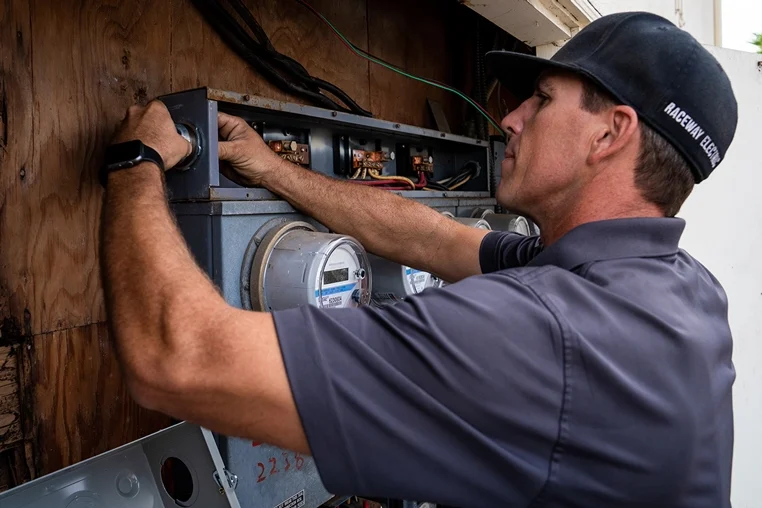Electrician Licensing
kansas Electrician: How to get certified and licensed in KS
Electrician Licensing
Kansas electrician license:
Everything you need to know
The Kansas electrical industry is full of job opportunities for licensed electricians. A license allows you to own an electrical business or supervise other electricians while working for a company.
Read this Kansas electrical license guide. It contains everything you need to get started in the industry.
Does Kansas require an electrical license?
Kansas electricians must possess a valid electrical license to install, maintain, or repair commercial or residential electrical systems.
What are the different types of electrical licenses in Kansas?
The different types of electrical licenses in Kansas are journeyman electrician, master electrician, and electrical contractor.
Journeyman electricians maintain, modify, and install electrical systems and apparatus in Kansas. Applicants must:
- Have two years of electrician apprentice experience.
- Pass the Journeyman Electrician International Council Code Exam.
- Possess a high school diploma or GED.
- Be at least 18 years old.
Master electricians install, repair, and maintain electrical wiring and control systems. They supervise journeyman electricians and electrician apprentices. Applicants must:
- Pass a Master Electrician International Code Council Exam.
- Complete a minimum of two years as a licensed journeyman electrician.
- Be at least 18 years old.
- Possess a high school diploma or GED.
Electrical contractors operate electrical businesses and hire licensed electricians to complete electrical work. Electrical contractor classifications are Class A (general license), Class C (residential license), and Class D (maintenance license). Applicants must:
- Have at least $300,000 of general liability electrician insurance coverage.
- Have workers’ compensation insurance.
- Have vehicle insurance.
- Pass an examination or have electrician training and experience.
Kansas electrical licenses are issued by county administrators. Each county has different application requirements and procedures. After you receive your license, you are authorized to perform electrician work throughout the state. The average hourly pay for Kansas electricians is $22.81.
How to get an electrician license in Kansas
Find a Kansas electrician apprenticeship program. Submit an application and go through the interview process. Complete the apprenticeship program and sit for the journeyman electrician license test. Then, apply for a master electrician license after you complete two years as a journeyman electrician.
Electrician Apprenticeship Programs
Electrician apprenticeships are sponsored by different types of organizations, including privately-owned companies and unions. Application fees and training costs may vary. Trade schools and community colleges generally charge up to $350 per credit hour to enroll in their courses. Accredited trade schools, colleges, and universities have student loan and grant options.
Apprenticeship Program Prerequisites
- Be at least 18 years old.
- Attend an electrician apprentice interview.
- Have a high school diploma or GED.
- Commit to completing the apprenticeship program.
- Perform electrician duties.
On-the-Job Experience
- Learn Kansas electrical safety requirements and codes.
- Attend electrician training courses.
- Install, repair, and inspect electrical systems under the supervision of a supervisory electrician.
- Operate a company vehicle.
Kansas Electrical License Information: Each county has a different electrical license exam process. Exam fees are $100 per test. The minimum score to pass the exam is 70%.
Kansas Electrician Examination Content
- Electrical Installations
- Wiring Methods and Materials
- Fire Detection and Alarm Systems
- Outline Lighting and Electrical Signs
Examination Study Resources
Should I join an electrician union in Kansas?
As an electrician union member, you are required to pay monthly dues. Benefits of joining a union include a pension, sick pay, vacation pay, higher salary, and employer dispute resolution assistance.
How to use your electrician license to get a job
Whether you are an apprentice or a master electrician, there are plenty of electrician jobs in Kansas. The following tips can help you secure your next electrician job:
Where to Find Electrician Jobs
Electrician Job Search Tips
- Tailor your resume for each job.
- Apply for at least three jobs each day.
- Build relationships with senior officials in the electrical industry.
Helpful Electrician Job Interview Tips
- Wear business attire to your job interview.
- Arrive at your interview early.
- Practice your interviewing skills.
Electrician insurance in Kansas
The dangers of working with electricity include the risk of electrical shocks, fires, and burns. Kansas electricians buy insurance to protect themselves from these liabilities.
Kansas electricians must have a minimum of $300,000 of general liability insurance before they begin their careers. Self-employed electricians must pay for individual coverage. Employed electricians are generally insured by their employers.
Electrician industry trends
Companies in major cities and suburban areas are building office buildings and new homes at a fast rate. These companies hire electricians to install electrical systems in these properties.
Older homes are not equipped to handle modern technology. Homeowners hire electricians to reconfigure the electrical systems in their homes.
Electricians must stay abreast of new electrical industry trends. They attend electrical industry trade shows to learn about new technology.
Is My License Only Valid in Kansas?
Kansas does not have an electrical license reciprocity agreement with another state.
If you changed your name or address or misplaced your card, contact your local Kansas licensing board.
How Often Do I Need to Renew My Electrician License in Kansas?
Renew your Kansas electrician license every year. The electrician license renewal fee is $100.

Other industry licenses

Other industry licenses
LEARN FROM THE PROS
Helpful content for the trades
Explore our collection of helpful articles written by top experts in their field to seasoned pros in the field. Strengthen your field service knowledge and stay current on the latest industry topics and trends.